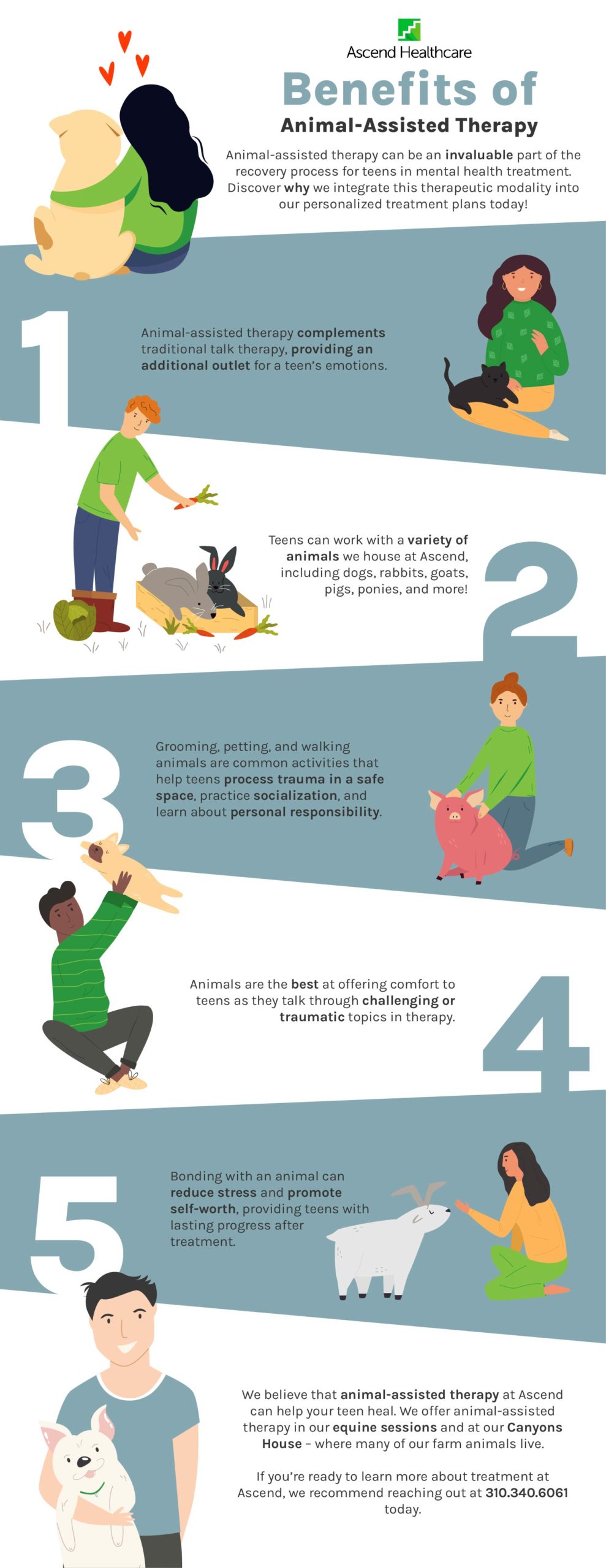Animal Assisted Therapy: Benefits for Teens
For decades, scientists have been researching animal-assisted therapy in relation to behavioral problems, autism-spectrum symptoms, emotional well-being, and medical difficulties for people of all ages. These studies conclusively show that this therapeutic modality has massive benefits when used as an additive to established interventions, like CBT, family therapy, and recreational therapy.
At Ascend, we use animals during therapy to improve teens’ overall well-being and help them find a way to openly engage with the treatment process as a whole. Learn more about the transformative benefits of animal-assisted therapy when you read further.
What Is Animal-Assisted Therapy?
Animal-assisted therapy (AAT) integrates socialization with friendly animals alongside standard therapeutic techniques such as cognitive-behavioral therapy, motivational enhancement therapy, family therapy, and more. At its core, AAT is based on the “Biophilia Hypothesis,” which describes the innate tendency of every human to seek connections with nature and other forms of life. Because people are already looking for connection, this form of therapy can be so helpful for teens who may be struggling emotionally and socially. In most cases, the presence of animals comforts teens as they deal with the difficult process of growth.
In a typical animal-assisted therapy scenario, teens progressing through a treatment program will have time to socialize and take care of animals. These sessions could be with dogs, cats, or various farm animals. At Ascend, we take our teens to equine therapy so they can interact with horses. We also have a farm-style treatment center that houses rabbits, goats, pigs, ponies, and other animals.
In addition to socialization, animal therapy for teens addresses their issues while in the comforting presence of animals and teaches them about their role in the world, personal responsibility, and how their actions affect others.
 Benefits of Animal-Assisted Therapy
Benefits of Animal-Assisted Therapy
Improved Social Dynamics
Interacting with animals can help teens who struggle with social anxiety learn how to become more confident in their interactions with humans. In addition, the non-judgmental presence of animals is soothing and creates a sense of natural connection that’s good for the brain and body.
Adds New Dimensions To Treatment Process
Sometimes, teens need a break from more direct forms of therapy. Animal-assisted therapy can be a fun switch-up that gets teens into a more fluid environment that reinforces openness and honesty. This fresh environment ensures teens feel comfortable opening up and helps them confront trauma they wouldn’t normally address in traditional therapy.
Improved Sensory Tolerance
Therapy dogs and other animals can provide a safe and unique way to build tolerance toward triggering sounds, textures, and smells – especially for teens who have suffered from trauma. Research shows that the calming presence of an animal is a highly effective mode of healing for teens to rewire their relationship with physical and emotional triggers.
Reduced Impulsive Behaviors
Teens innately recognize the importance of selflessness and the need to control their urges in order to be safe in the presence of an animal. In animal-assisted therapy, teens who usually struggle with a gentle touch or safe boundaries show incredible improvement in restraint. These skills often translate to other situations outside of treatment as well.
Using Animal-Assisted Therapy to Promote Healing at Ascend
Now that you know what animal-assisted therapy is, you can see how it helps teens under our care thrive. They build empathy toward others and become more willing to take responsibility for their actions. AAT is especially useful when our clients feel like they can’t reach out to another human for help. Instead, our animals provide a stepping stone to discussing their problems with our mental health professionals.
At Ascend, we believe that animal therapy for teens is integral to our clinical approach. So if you or someone you know could benefit from AAT and other treatment modalities in our residential treatment centers, we recommend getting in touch with us right away. Fill out our online contact form or call us at 310.388.3713 today.



